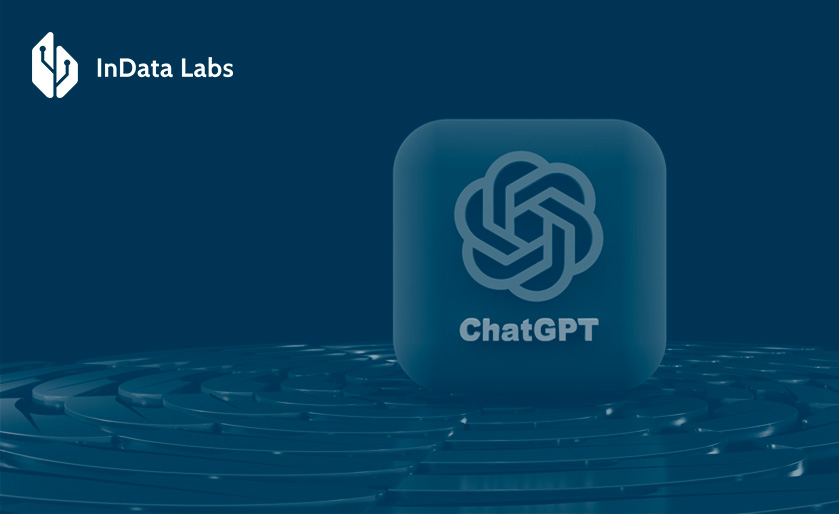Since its advent, Open AI’s ChatGPT has left no industry untouched, including retail. ChatGPT for retail is an indispensable tool with promising potential and impressive generative capabilities. Apart from selected, low-value tasks, the GPT model can transform supply chain management as a whole and streamline communication between stakeholders.
Let’s have a closer look at the key ChatGPT use cases in retail and supply management that can revolutionize your business in the coming years. We’ll also go over the implementation process and the main concerns associated with ChatGPT.
The fundamentals of ChatGPT?
ChatGPT is a conversational AI interface based on a foundational large language model (LLM). The tool also leverages both supervised and reinforcement learning techniques as well as a neural network for natural language processing tasks. The language model can respond to questions in a human-like manner and generate multiple types of content, including text, audio, and video.
The specific capability that makes it a Swiss army knife for all industries is the ability of the chatbot to handle complex questions conversationally.

Source: Unsplash
Transforming shopping experiences with ChatGPT in retail
With the ever-evolving customer preferences and business landscape, retailers demand more flexibility and optimization in their businesses. ChatGPT for retail is projected to bring much-needed agility and automation into formulaic tasks and customer-facing applications.
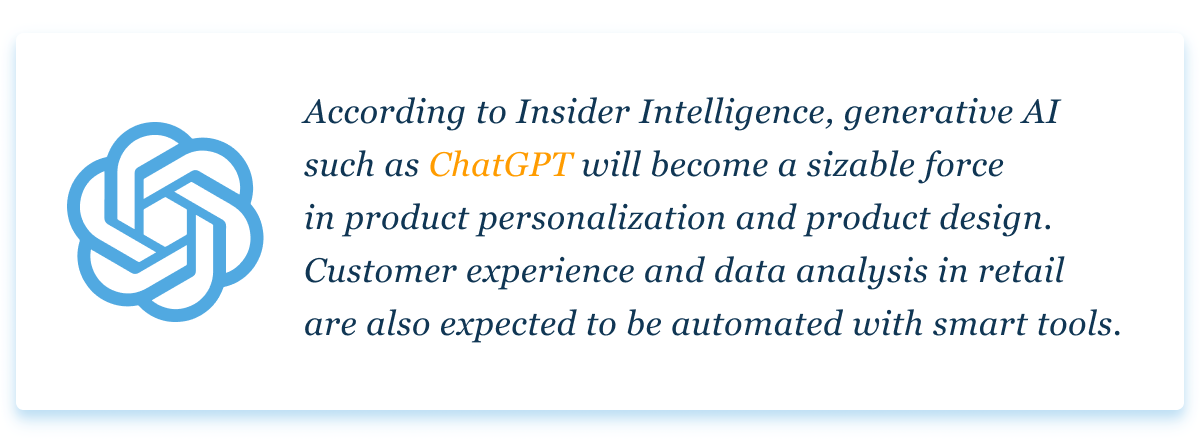
Areas with less impressive adoption ROIs include content creation, chatbots, and enhanced search. Nevertheless, the potential of ChatGPT for market expansion is undeniable in all cases.
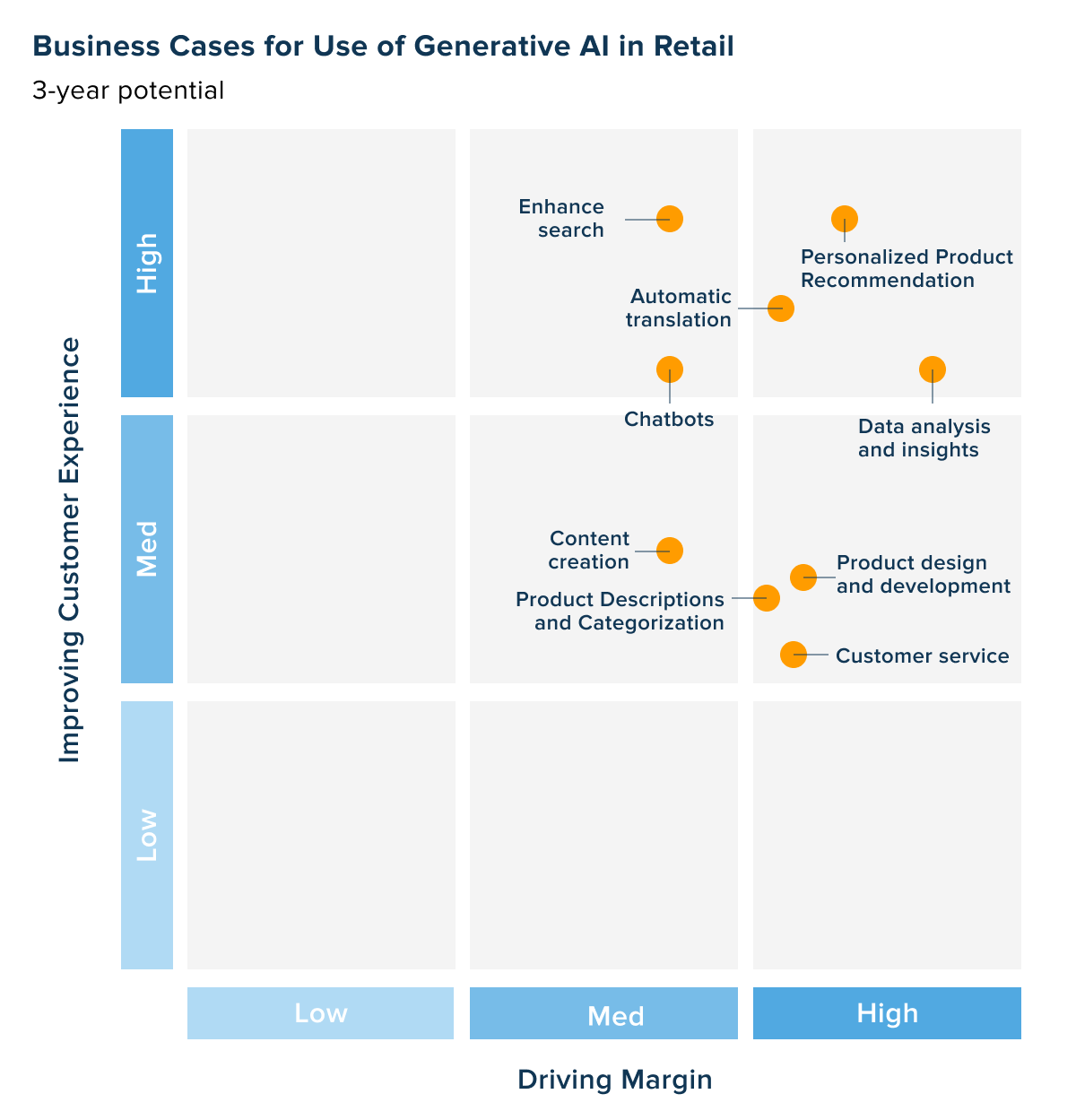
Tailored product recommendations
In the experience economy, retailers strive to deliver hyper-personalized experiences to customers across channels. Marketing copies, product recommendations, and sales offerings now have to be tailored to catch the eye of a consumer.
By analyzing a customer’s purchase history and buying habits, ChatGPT can generate personalized shopping experiences. On-point recommendations, upselling and cross-selling offers, and granular product recommendations can all be created at scale and with little manual effort.

Source: Unsplash
Virtual assistant for retail
As ChatGPT is cut out for natural language processing tasks, it makes it a great supplementary tool for your customer service chatbots. Not only does it produce personalized responses with high accuracy, but it also can pick up previous conversation points with the customer.
Unlike garden-variety chatbots, the capabilities of LLMs are not limited to a single task. Conversational models can also provide customers with updates on the status of their orders, suggest the right shipping method, and help schedule a delivery. As a self-service add-on, GPT-based chatbots guide customers through the purchasing process and inform their purchasing decisions.

Source: Unsplash
A great use case can be made out of Salesforce, a well-known provider of SaaS for retail. The company introduced a GPT-based tool that assists retailers in auto-generating personalized agent chat replies to customers.
Product descriptions and categorization
Marketing and sales teams can also use ChatGPT tools as retail virtual assistants for generating websites, social media, and product descriptions.
Retailers can set up the model to automatically generate product descriptions from a list of keywords or product descriptors. The model also allows you to select the description tone that fits your brand voice and target audience.
Back-office automation
Business process automation is another prominent use case of ChatGPT for merchants. Retail businesses can make use of the generative AI model to streamline business communication, document management, and even inventory management. For example, the tool can automatically generate purchase orders when the inventory reaches a minimum stock level.

Source: Unsplash
Also, large language models can automate the processing of orders, including the creation of invoices and packing lists. In all these cases, language models either need to be integrated via an API into the company’s stack or to be fed task-related data sets.
Sentiment analysis
Using ChatGPT for sentiment analysis is an easy and efficient way to extract subjective information from customer feedback. Thanks to unmatched NLP capabilities, the tool can look deep into a controversial customer response and label the mixed, mid-polarity sentiment behind the message.

Source: Unsplash
Moreover, a ChatGPT retail application can tune into customer reviews and social media interactions. This allows companies to analyze consumers’ feelings and attitudes toward the brand, products, and services as well as compare how they stack up against competitors. Retailers can leverage this data to adjust their marketing strategies, digital and physical experiences, and product offerings.
Decision-making
The growth of virtual assistants in retail is also associated with the ability of tools like ChatGPT to support business decision-making. From forecasting to analysis to research, ChatGPT in retail can support the strategic planning of merchants by doing the heavy lifting of data analysis.
For example, AI in retail applications can analyze shopper behavior data to inform merchandising sales and marketing decisions. Also, intelligent models help retailers identify trending products that resonate with customers based on historical data. SWOT analysis of competitors, trend research, profitability analysis, and all other types of decision-making can also be delegated to large language models.

Source: Unsplash
ChatGPT use cases in supply chain management
Rising risks, disruptions, and difficult demand forecasting have made supply chain management an arduous task for global businesses. Moreover, the complexity of the supply chain results in limited visibility for 62% of companies.
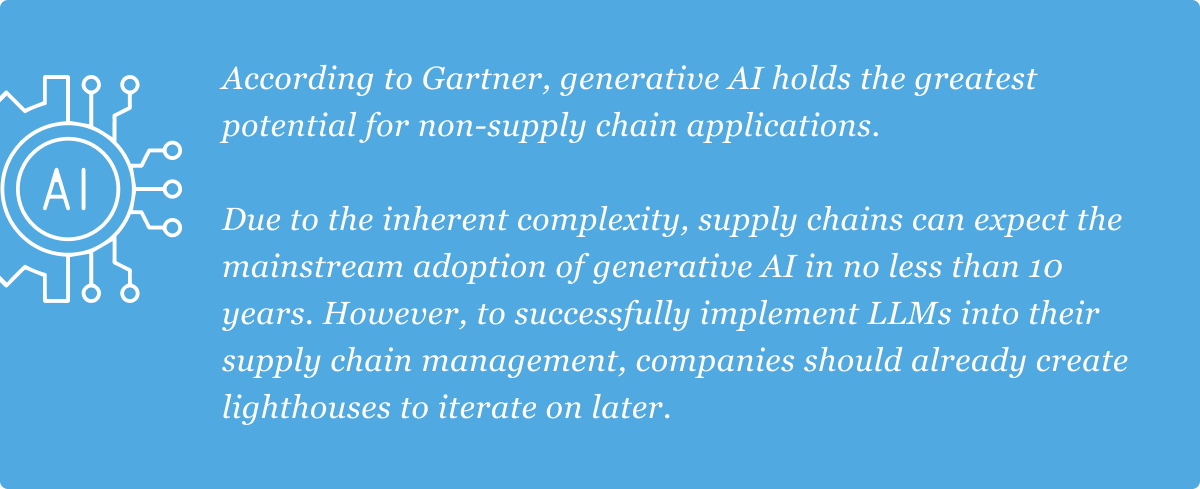
Top applications of ChatGPT in the supply chain
Although the majority of the applications of the ChatGPT supply chain are yet to come on stage, there are at least 5 ways how you can simplify logistics with generative AI.
Inventory management
Just like in retail, Generative AI models can provide accurate insights into inventory levels in real-time, prevent stockouts, and align orders from suppliers directly with your production schedules. Combined, these insights create a breeding ground for a just-in-time (JIT) inventory system and minimize supply chain inefficiencies.

Source: Unsplash
Procurement and supplier management
Generative AI tools can become a deal breaker for procurement teams, reducing the time and effort required to develop RFPs. Based on the unique data, LLMs generate tailored Requests For Proposals at scale, which also allows for an unbiased evaluation of vendors.
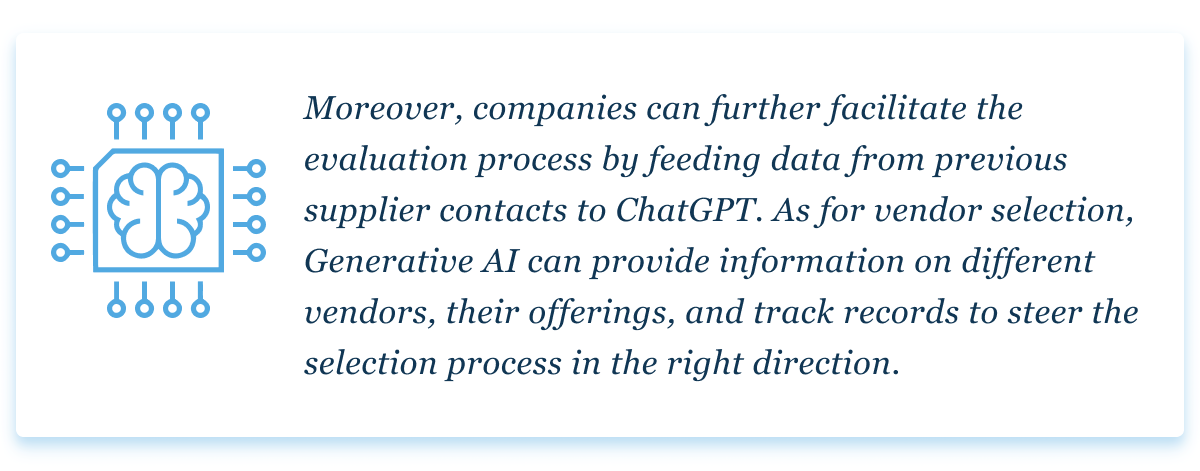
Routes and last-mile delivery
Logistics management is another use case for ChatGPT that takes over the burden of route planning for companies. By feeding on real-time traffic information, road conditions, and weather patterns, generative engines can find the most efficient routes for vehicles, offer deliberate route changes, and calculate the number of drivers for a given vehicle.
According to DHL, ChatGPT and the like can come helpful in load building, container management, and choice of transportation. For example, the chatbot can help select the ideal load carriers and packaging to optimize space usage in trucks.

Source: Unsplash
Document management
AI-powered supply chain solutions can also act as virtual office assistants and lend a helping hand in report generation and supplier interactions. Also, the adoption of language models enables companies to automate contract creation. A model can automatically fill in the relevant information, such as prices, delivery schedules, and terms, by using data from previous contracts.

Contingency planning
Generative models can add to business resiliency and improve emergency preparedness. For example, based on the ERP data, ChatGPT can help businesses spot critical supply chain units and put in place backup plans to ensure uninterrupted business operations in case of disruptions.
Moreover, generative AI has the capacity to predict supply chain disruption and demand shifts by analyzing data from various sources, including social media, news, and other publicly available data.

Source: Unsplash
How to implement ChatGPT for retail and supply chain management
Currently, most businesses pursue the test-and-learn mindset when it comes to generative AI adoption. Consumed as they are, foundation models support global companies in simple, generic tasks. However, once customized, AI models can be employed to handle complex, industry-specific flows. Let’s have a closer look at those two adoption strategies for GPT-like tools.
Consume
Generative AI and LLM applications are marketed as off-the-shelf solutions, providing businesses with an instant and accessible foray into the technology. In this case, users can leverage ChatGPT integration services to enable access via API or adjust the model through prompt tuning and prefix learning. This adoption approach is a great option for lighthouse users and general applications that do not require unique background data.
Customize
To make the tool widely usable in the specific company, users need to customize the model by fine-tuning it with their own data. Alternatively, companies may opt for GPT solutions development to build custom applications on top of the foundation model. In both cases, the GPT model delivers higher performance and accuracy.
Maximize the impact with custom GPT solutions
Generative AI has tilted our perspective on applying AI solutions in business. From retail to supply chain management, this nifty form of artificial intelligence has come to transform the way businesses operate and unlock a new level of business agility.

Source: Unsplash
ChatGPT and the like step in to automate content creation, streamline sentiment analysis, and augment your business decisions in a human-like manner. ChatGPT can also monitor your inventory levels, supplement the abilities of virtual assistants in retail, and track warehouse data to forecast demand.
But before you forge full-speed ahead with developing AI for retail, make sure to identify the right integration approach. While using the tool as-is does the job for generic tasks, you need to fine-tune the model to use it for more complex, strategic business workflows.
Integrate ChatGPT for business efficiency
Looking for a way to accelerate the pace of your business innovation and exponentially enhance productivity? Contact us, and our ChatGPT consultants will reach out to you.

